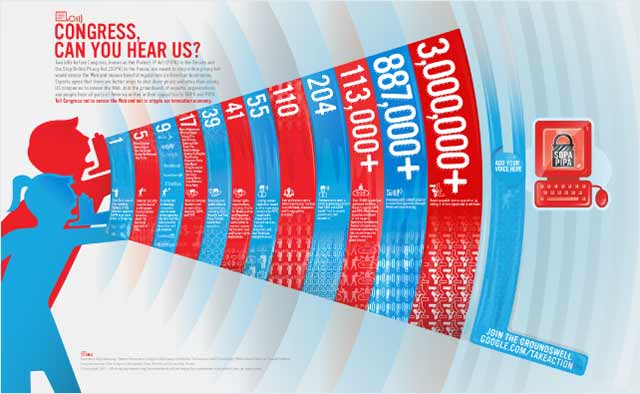Yesterday’s Internet protest over the pending SOPA and PIPA legislation seems to have made a real impact, both in terms of blocking the legislation (likely) to the way things get done inside the Beltway. A report in The New York Times described the feud over the “once-obscure bills” as a major face-off in the battle between the “new and old economy”:
“[T]his formidable old guard was forced to make way for the new as Web powerhouses backed by Internet activists rallied opposition to the legislation through Internet blackouts and cascading criticism, sending an unmistakable message to lawmakers grappling with new media issues: Don’t mess with the Internet.
As a result, the legislative battle over two once-obscure bills to combat the piracy of American movies, music, books and writing on the World Wide Web may prove to be a turning point for the way business is done in Washington. It represented a moment when the new economy rose up against the old.”

This infographic posted on Google’s site encouraged users to “End Piracy, Not Liberty” and linked to this PDF that laid out the campaign so far, and what the user could do to take part. (from the Google website)
Several politicians who once favored the bills announced a change of heart on their Facebook pages. Business Week reports that “13 co-sponsors, eight in the Senate and five in the House began withdrawing their support for the Hollywood-backed measures.” Some credit the blackout with “upending the traditional lobbying” that goes on in Washington.
“These organizations have reinvented a lot of the ways we live, how we connect, how we absorb media,” said Rogan Kersh, an associate dean at New York University’s Wagner School who conducts research on lobbying. “They’re now trying to reinvent how we carry out democratic politics.”
One question is whether there will be any repercussions for the White House over a statement it released late last Friday pointing out flaws in the antipiracy legislation. Politico reports that the White House move “sparked grumbling among entertainment insiders” and “could harm Obama’s fundraising prospects.”
What do you think? Is yesterday’s so-called “netizen revolt” a new model for getting things done in Washington?

